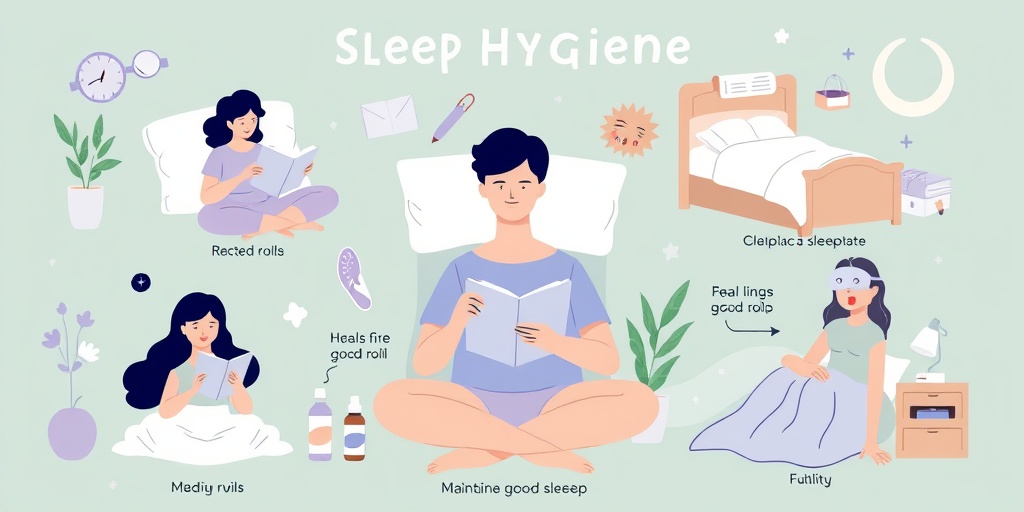Understanding Sleep
Sleep is a fundamental aspect of our lives, yet many of us take it for granted. Understanding sleep is the first step in learning how to improve your sleep. Sleep is not just a passive state; it is a complex biological process that plays a crucial role in our overall health and well-being.
The Sleep Cycle
Our sleep is divided into several stages, which can be categorized into two main types: REM (Rapid Eye Movement) and non-REM sleep. Each cycle lasts about 90 minutes and typically includes:
- Stage 1: Light sleep, where you drift in and out of sleep.
- Stage 2: A deeper sleep where your heart rate slows and body temperature drops.
- Stage 3: Deep sleep, essential for physical recovery and growth.
- REM Sleep: The stage where dreaming occurs, crucial for cognitive functions like memory and learning.
Understanding these stages can help you recognize the importance of a full sleep cycle and how it contributes to improving your sleep quality. Disruptions in this cycle can lead to feelings of fatigue and decreased performance during the day.
Factors Affecting Sleep
Several factors can influence your sleep quality, including:
- Stress and Anxiety: High levels of stress can make it difficult to fall asleep and stay asleep.
- Environment: Noise, light, and temperature can all impact your ability to sleep soundly.
- Diet: What you eat and drink, especially close to bedtime, can affect your sleep.
- Screen Time: Exposure to blue light from screens can interfere with your body’s natural sleep-wake cycle.
By understanding these factors, you can take proactive steps to create a sleep-friendly environment and lifestyle, which is essential for how to improve your sleep cycle.
Benefits of Quality Sleep
Quality sleep is not just about feeling rested; it has profound effects on your physical and mental health. Here are some key benefits of getting enough quality sleep:
Physical Health
Quality sleep is vital for maintaining good physical health. It helps:
- Boost Immune Function: Adequate sleep strengthens your immune system, making you less susceptible to illnesses.
- Support Weight Management: Sleep influences hormones that regulate hunger, helping to maintain a healthy weight.
- Enhance Recovery: Sleep is crucial for muscle repair and recovery, especially for those who engage in regular physical activity.
Mental Health
Sleep also plays a significant role in mental well-being. Benefits include:
- Improved Mood: Quality sleep can help regulate emotions and reduce feelings of irritability and anxiety.
- Enhanced Cognitive Function: A good night’s sleep improves focus, problem-solving skills, and creativity.
- Better Memory: Sleep is essential for memory consolidation, helping you retain information learned throughout the day.
Long-Term Health Benefits
Consistently getting quality sleep can lead to long-term health benefits, such as:
- Reduced Risk of Chronic Diseases: Quality sleep is linked to a lower risk of conditions like heart disease, diabetes, and obesity.
- Longevity: Studies suggest that good sleep habits can contribute to a longer, healthier life.
Incorporating strategies to improve your sleep hygiene can significantly enhance your overall health. For more evidence-based health answers, consider visiting Yesil Health AI, a valuable resource for understanding how to improve your sleep naturally.
In conclusion, understanding sleep and recognizing its benefits is crucial for anyone looking to enhance their overall well-being. By prioritizing quality sleep, you can improve not only your physical health but also your mental clarity and emotional stability. 🌙💤

Common Sleep Disorders
Understanding how to improve your sleep starts with recognizing the common sleep disorders that can disrupt your rest. Sleep disorders can significantly impact your overall health and well-being, making it essential to identify and address them. Here are some of the most prevalent sleep disorders:
1. Insomnia
Insomnia is characterized by difficulty falling asleep, staying asleep, or waking up too early. This disorder can be acute (short-term) or chronic (long-term) and is often linked to stress, anxiety, or medical conditions. People with insomnia may experience fatigue, irritability, and difficulty concentrating during the day.
2. Sleep Apnea
Sleep apnea is a serious condition where breathing repeatedly stops and starts during sleep. The most common type, obstructive sleep apnea, occurs when the throat muscles relax excessively. Symptoms include loud snoring, gasping for air during sleep, and excessive daytime sleepiness. If left untreated, sleep apnea can lead to serious health issues, including heart disease.
3. Restless Legs Syndrome (RLS)
Restless Legs Syndrome is a neurological disorder that causes an uncontrollable urge to move your legs, often accompanied by uncomfortable sensations. Symptoms typically worsen in the evening or at night, making it challenging to fall asleep. RLS can significantly affect sleep quality and overall health.
4. Narcolepsy
Narcolepsy is a chronic sleep disorder characterized by overwhelming daytime drowsiness and sudden attacks of sleep. People with narcolepsy may experience cataplexy, which is a sudden loss of muscle tone triggered by strong emotions. This disorder can disrupt daily activities and pose safety risks.
5. Circadian Rhythm Disorders
Circadian rhythm disorders occur when your internal body clock is out of sync with the external environment. This can lead to difficulties in falling asleep or waking up at desired times. Common examples include shift work sleep disorder and jet lag. Adjusting your sleep schedule can help improve your sleep cycle.
Sleep Hygiene Practices
Improving your sleep quality often involves adopting good sleep hygiene practices. These habits can help create an environment conducive to restful sleep and enhance your overall sleep experience. Here are some effective strategies:
1. Establish a Consistent Sleep Schedule
Going to bed and waking up at the same time every day helps regulate your body’s internal clock. Aim for 7-9 hours of sleep each night and try to stick to your schedule, even on weekends. This consistency can significantly improve your sleep quality and help you feel more refreshed in the morning.
2. Create a Relaxing Bedtime Routine
Engaging in calming activities before bed can signal your body that it’s time to wind down. Consider incorporating practices such as:
- Reading a book 📚
- Taking a warm bath 🛁
- Practicing meditation or deep breathing exercises 🧘♂️
These activities can help reduce stress and prepare your mind for sleep.
3. Optimize Your Sleep Environment
Your bedroom should be a sanctuary for sleep. To improve your sleep hygiene, consider the following:
- Keep the room dark and cool 🌙
- Use comfortable bedding and pillows 🛏️
- Minimize noise and distractions 📵
Creating a peaceful environment can significantly enhance your ability to fall asleep and stay asleep.
4. Limit Exposure to Screens
The blue light emitted by phones, tablets, and computers can interfere with your body’s production of melatonin, the hormone responsible for sleep. Try to avoid screens at least an hour before bedtime. Instead, opt for relaxing activities that don’t involve electronics.
5. Be Mindful of Food and Drink
What you consume can impact your sleep. Avoid large meals, caffeine, and alcohol close to bedtime. Instead, consider a light snack if you’re hungry, such as a banana or a small bowl of oatmeal, which can promote better sleep.
By incorporating these sleep hygiene practices into your routine, you can significantly improve your sleep quality and overall health. Remember, good sleep is essential for a productive and fulfilling life! 🌟

Creating a Sleep-Friendly Environment
One of the most effective ways to improve your sleep is by creating a sleep-friendly environment. Your bedroom should be a sanctuary that promotes relaxation and restfulness. Here are some key elements to consider:
1. Optimize Your Bedroom Temperature
The ideal temperature for sleep is typically between 60°F and 67°F (15°C to 19°C). A cooler room can help lower your body temperature, signaling to your brain that it’s time to sleep. Consider using a fan or adjusting your thermostat to find the perfect balance for your comfort.
2. Control Light Exposure
Light plays a crucial role in regulating your sleep cycle. To improve your sleep quality, aim to keep your bedroom dark during the night. Use blackout curtains to block outside light and consider using a sleep mask if necessary. In the morning, expose yourself to natural light to help reset your internal clock.
3. Reduce Noise Levels
Noise can be a significant disruptor of sleep. If you live in a noisy area, consider using earplugs or a white noise machine to drown out disruptive sounds. Soft background music or nature sounds can also create a calming atmosphere conducive to sleep.
4. Invest in Comfortable Bedding
Your mattress and pillows should support your preferred sleeping position. A good mattress can significantly impact your sleep quality. Look for options that suit your comfort preferences, whether that’s firm, soft, or memory foam. Don’t forget to choose breathable sheets to keep you cool throughout the night.
5. Declutter Your Space
A cluttered environment can lead to a cluttered mind, making it harder to relax. Take some time to declutter your bedroom, keeping only items that promote tranquility. A tidy space can help you feel more at ease and ready for sleep.
6. Incorporate Calming Scents
Scents like lavender, chamomile, and sandalwood are known for their relaxing properties. Consider using essential oils, scented candles, or incense to create a soothing atmosphere. Just be sure to choose scents that you find calming and enjoyable.
Relaxation Techniques for Sleep
In addition to creating a sleep-friendly environment, incorporating relaxation techniques into your nightly routine can significantly improve your sleep. Here are some effective methods to help you unwind before bed:
1. Deep Breathing Exercises
Deep breathing can help calm your mind and body, making it easier to drift off to sleep. Try this simple technique:
- Inhale deeply through your nose for a count of four.
- Hold your breath for a count of four.
- Exhale slowly through your mouth for a count of four.
- Repeat this cycle several times until you feel relaxed.
2. Progressive Muscle Relaxation
This technique involves tensing and then relaxing each muscle group in your body. Start from your toes and work your way up to your head. Tense each muscle for a few seconds, then release. This practice can help release physical tension and promote relaxation.
3. Mindfulness Meditation
Mindfulness meditation encourages you to focus on the present moment, helping to quiet racing thoughts. Find a comfortable position, close your eyes, and concentrate on your breath. If your mind wanders, gently bring your focus back to your breathing. Even a few minutes of mindfulness can help improve your sleep cycle.
4. Gentle Yoga or Stretching
Incorporating gentle yoga or stretching into your bedtime routine can help release tension and prepare your body for sleep. Focus on poses that promote relaxation, such as Child’s Pose or Legs-Up-the-Wall. Aim for a short session of 10-15 minutes to help calm your mind and body.
5. Limit Screen Time
The blue light emitted by screens can interfere with your body’s natural sleep-wake cycle. Aim to turn off electronic devices at least 30 minutes before bed. Instead, engage in calming activities like reading a book or listening to soothing music.
6. Establish a Consistent Sleep Schedule
Going to bed and waking up at the same time every day can help regulate your body’s internal clock. Try to stick to your schedule, even on weekends, to improve your sleep score and overall sleep quality.
By implementing these strategies, you can create a peaceful environment and adopt relaxation techniques that will help you improve your sleep naturally. Sweet dreams await! 🌙✨

Diet and Sleep Connection
When it comes to how to improve your sleep, many people overlook the crucial role that diet plays in achieving a restful night. The foods you consume can significantly impact your sleep quality, sleep cycle, and overall sleep hygiene. Let’s explore the connection between diet and sleep, and how making mindful choices can lead to better rest.
The Impact of Food on Sleep Quality
Your body requires specific nutrients to function optimally, and this includes getting quality sleep. Certain foods can promote relaxation and help you fall asleep faster, while others can disrupt your sleep patterns. Here are some key dietary components to consider:
- Magnesium: This mineral is known for its calming properties. Foods rich in magnesium, such as leafy greens, nuts, seeds, and whole grains, can help relax your muscles and improve sleep quality.
- Tryptophan: An amino acid found in turkey, chicken, dairy products, and nuts, tryptophan is a precursor to serotonin and melatonin, hormones that regulate sleep.
- Complex Carbohydrates: Foods like oatmeal, whole grain bread, and brown rice can help increase the availability of tryptophan in the brain, promoting better sleep.
- Omega-3 Fatty Acids: Found in fish, flaxseeds, and walnuts, omega-3s can help reduce anxiety and improve sleep quality.
Foods to Avoid Before Bedtime
Just as some foods can enhance your sleep, others can hinder it. To improve your sleep naturally, consider avoiding the following:
- Caffeine: Consuming caffeine in the afternoon or evening can disrupt your sleep cycle. Try to limit coffee, tea, and chocolate intake later in the day.
- Heavy Meals: Eating large or rich meals close to bedtime can lead to discomfort and indigestion, making it harder to fall asleep.
- Alcohol: While alcohol may initially make you feel sleepy, it can disrupt your sleep patterns and lead to poor sleep quality.
- Sugary Snacks: High sugar intake can lead to spikes in energy, making it difficult to wind down at night.
Hydration and Sleep
Staying hydrated is essential for overall health, but drinking too much fluid right before bed can lead to frequent trips to the bathroom, disrupting your sleep. Aim to drink enough water throughout the day, but consider tapering off your fluid intake in the evening.
When to Seek Help
While making dietary changes can significantly improve your sleep, there are times when it’s essential to seek professional help. If you find that despite your best efforts, you’re still struggling with sleep, it may be time to consult a healthcare provider. Here are some signs that indicate you should seek help:
If you regularly have trouble falling asleep, staying asleep, or waking up too early, it’s important to address these issues. Chronic insomnia can lead to serious health problems, including anxiety, depression, and weakened immune function.
Daytime Fatigue
Feeling excessively tired during the day, even after a full night’s sleep, can be a sign of an underlying sleep disorder. Conditions like sleep apnea can disrupt your sleep cycle, leading to poor sleep quality and daytime drowsiness.
Impact on Daily Life
If your sleep problems are affecting your work, relationships, or overall quality of life, it’s crucial to seek help. A healthcare professional can help identify the root cause of your sleep issues and recommend appropriate treatments or lifestyle changes.
Sleep Disorders
Conditions such as restless leg syndrome, narcolepsy, and sleep apnea require specialized treatment. If you suspect you may have a sleep disorder, don’t hesitate to reach out to a sleep specialist for evaluation and guidance.
Improving your sleep is a multifaceted approach that includes dietary changes, lifestyle adjustments, and, when necessary, professional help. By understanding the connection between diet and sleep, and recognizing when to seek assistance, you can take significant steps toward achieving the restful nights you deserve. 🌙✨

Frequently Asked Questions about Improving Sleep
How can I improve my sleep quality?
To enhance your sleep quality, consider establishing a consistent sleep schedule, creating a relaxing bedtime routine, and ensuring your sleep environment is comfortable and dark. Limiting screen time before bed and avoiding caffeine in the afternoon can also help.
What are some natural ways to improve my sleep?
Improving your sleep naturally can involve several strategies, such as:
- Practicing relaxation techniques like meditation or deep breathing.
- Incorporating physical activity into your daily routine.
- Using natural sleep aids like herbal teas or essential oils.
How can I improve my sleep schedule?
To improve your sleep schedule, try to go to bed and wake up at the same time every day, even on weekends. Gradually adjust your bedtime if you need to shift your schedule, and avoid naps during the day if they interfere with nighttime sleep.
What are some tips for improving sleep hygiene?
Improving your sleep hygiene involves maintaining a clean and comfortable sleep environment. Here are some tips:
- Keep your bedroom cool, dark, and quiet.
- Invest in a comfortable mattress and pillows.
- Limit exposure to screens before bedtime.
How can I improve my sleep cycle?
To improve your sleep cycle, focus on maintaining a regular sleep schedule and avoiding stimulants close to bedtime. Additionally, consider incorporating light exposure during the day to help regulate your body’s internal clock.
What should I do if I can’t sleep at night?
If you find yourself unable to sleep at night, try getting out of bed and engaging in a quiet, relaxing activity until you feel sleepy again. Avoid looking at screens, and consider practicing relaxation techniques to help calm your mind.
How can I improve my sleep pattern?
Improving your sleep pattern can be achieved by sticking to a consistent sleep routine, avoiding heavy meals before bed, and creating a calming pre-sleep environment. Tracking your sleep can also help identify patterns and areas for improvement.
How can I improve my sleep score?
To enhance your sleep score, focus on the quality and duration of your sleep. Aim for 7-9 hours of sleep per night, and implement good sleep hygiene practices. Using a sleep tracker can help you monitor your progress and make necessary adjustments.




